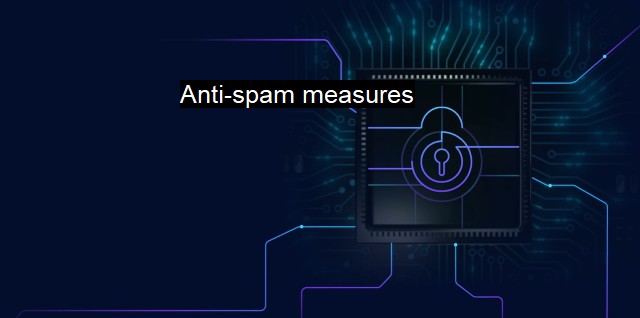What are Anti-spam measures?
The Importance of Anti-Spam Measures for Cybersecurity: Protecting Your Inbox from Dangerous Emails
In the contemporary digitalized world, ensuring data security is of utmost importance, particularly considering the myriad of threat sources that persist in the online landscape. Among those threats, spam, or unsolicited and unwanted emails, feature predominantly. From simple disruptions to channels of communication to potential vehicles for practicing illegal phishing activities, spam can lead to a variety of problems. Therefore, effective countermeasures, known as "anti-spam measures", have been developed to mitigate this troublesome risk.Anti-spam measures count as protective measures functioning to reduce or eliminate the influx of spam emails. In the wider context of cybersecurity, anti-spam measures are crafted not only to ensure smoother communication but to protect systems against possible attacks. Cybersecurity is a broad discipline that focuses on safeguarding systems, networks, and programs from digital threats. Among these protective measures, anti-spam falls under the umbrella of an antivirus depicting a defense mechanism specifically targeting spam.
Spam often appears harmless, with the annoyance factor being its most obvious negative quality. Still, it is critical to remember that the benign-looking spam email can include malicious links, software, and attachments, endangering user privacy, financial information, and potentially system stability. Spams can serve as the carrier of viruses, worms, trojans, and ransomware that can infiltrate systems, retrieve crucial data, alter files, and essentially create havoc within cyber infrastructure. Antivirus programs and anti-spam measures are essential in these cases to able to provide multiple levels of protection against such threats.
The sophistication of anti-spam measures depends on the antivirus software's complexity. Primarily, anti-spam measures aim to block contaminants carried in spam, including viruses or malware. beyond this primary precautionary goal, anti-spam measures can also incorporate artificial intelligence and machine learning capabilities to enhance their effectiveness and predictability.
Machine learning technology evaluates the patterns of received emails and lets the software assess whether an incoming email can potentially be a spam message. This intelligent analysis based on algorithms and patterns aids in the identification of spam, even distinguishes words that are commonly used in spam emails. Provided an email is marked as spam, the software removes it before reaching the user's inbox. In some advanced cases, the software can also learn from the user's behavior over time, thereby improving spam detection.
Anti-spam measures extend to the securing of mailing lists. Spammers often compromise these lists, leading to a surge of unsolicited emails. Through secure and encrypted mailing lists, the movement of spam can be curtailed. Anti-spam solutions also incorporate authentication measures, like Domain-based Message Authentication, Reporting and Conformance (DMARC), which provides extra-security.
Stronger filters are part of a robust anti-spam measure ensuring high-risk emails, and suspicious senders are relegated to the spam folder or blocked entirely. ISPs, too, are ramping up actionable policies to reduce spam flow through network-level filtering.
Anti-spam measures are an integral part of the cybersecurity ecosphere, playing a pivotal role within antivirus frameworks. As the sophistication of spam emails escalates, tighter anti-spam measures are necessary, paving the path toward innovative defense mechanisms. The encroachment of privacy, the risks posed towards data security and the potential disruptions instigated by spam can thus be curtailed or entirely eradicated through thoughtful and technologically advanced applications of anti-spam measures. Besides adverse effects, they also bring to surface the intricate nature of cybersecurity, highlighting how crucial it is to stay equipped and updated with evolving digital threats. The right participation and enhanced awareness in the cyber world will lead to fruitful cybersecurity. In this view, anti-spam measures should be viewed as an indispensable prime shield against pervasive spam threats.

Anti-spam measures FAQs
What are anti-spam measures?
Anti-spam measures refer to the techniques and technologies that are used to prevent or reduce the amount of spam messages that are delivered to email inboxes or other forms of electronic communication. Anti-spam measures may include the use of filters, blacklists, whitelists, and other methods.How do anti-spam measures work?
Anti-spam measures work by analyzing incoming messages and determining whether they are spam or legitimate messages. This can involve looking at the sender information, the message content, and other factors. If a message is identified as spam, it may be blocked, filtered, or marked as junk mail.What are some common types of anti-spam measures?
Some common types of anti-spam measures include content filtering, sender authentication, IP filtering, and reputation scoring. Content filtering involves looking for specific keywords, phrases, or patterns in the message content that are commonly used in spam messages. Sender authentication involves checking the sender's email address or domain to ensure that it is legitimate. IP filtering involves blocking or filtering messages from specific IP addresses that are known to send spam. Reputation scoring involves assigning a score to each sender based on their email sending history and other factors.Why are anti-spam measures important for cybersecurity and antivirus protection?
Anti-spam measures are important for cybersecurity and antivirus protection because they can help to prevent the delivery of malicious messages that could contain malware, phishing links, or other threats. By reducing the amount of spam that reaches users' inboxes, anti-spam measures can also help to reduce the risk of users falling victim to social engineering attacks.| | A | | | B | | | C | | | D | | | E | | | F | | | G | | | H | | | I | | | J | | | K | | | L | | | M | |
| | N | | | O | | | P | | | Q | | | R | | | S | | | T | | | U | | | V | | | W | | | X | | | Y | | | Z | |
| | 1 | | | 2 | | | 3 | | | 4 | | | 7 | | | 8 | | |||||||